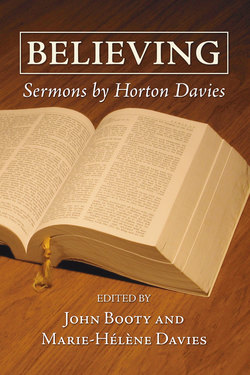Читать книгу Believing - Horton Davies - Страница 5
На сайте Литреса книга снята с продажи.
foreword
ОглавлениеWhat a very rich career Horton Davies had! Born in Wales of devout parents in 1916, he graduated from Edinburgh University, served in London during the Blitz, worked for several years in South Africa during the dark days of apartheid, and then moved to a teaching post at Princeton University. That is the skeleton of a remarkable ministry which enabled him to produce 35 learned books on a variety of issues. Although I never had the privilege of meeting him, his death in 2004 came as a sadness to me, because his writings were so well known that it was as if I had lost a good friend.
What I especially valued in Professor Davies was the seamlessness of his faith and academic work. Such was his commitment to the Christian faith, that it was never for him a dull and boring subject for intellectual enquiry. His faith was real and he tackled every topic and task with passionate interest.
Passion, indeed, runs like a golden thread through this collection of addresses. As I read the sermons in draft form I found myself reflecting on the difference between a great deal of modern preaching and the focus and themes of Horton’s addresses. Listening these days, in retirement, to the preaching of others I confess with dismay that so many sermons lack theological and intellectual depth, so many preachers lack passion and—this is the most worrying part—so many addresses seem to spring from hasty preparation, lacking in reflection.
None of that will be found in this anthology. Here we find addresses that are well prepared and aimed at intelligent people. Horton acknowledges the doubts and difficulties of modern people and he seeks to speak to his fellow men and women in terms and in a language that they will understand. He drew upon a well-stocked mind and, from a vast knowledge of literature and the experience of life, was able to inform and entertain his listeners. Perhaps it was the influence of his skill as a teacher that led to such a fierce commitment to connecting with others. Whether this is so or not, it is impossible to read any one of his addresses without knowing what his intention was in preaching it. With rigor he attempted to draw his listeners to a decision.
Indeed, this stress on communication made his preaching ‘evangelical’ in the best way that noble word is understood. Not for him fundamentalism, because his love of learning and commitment to truth, did not allow him to submit to superficial conclusions. However, neither was he a vague liberal to whom all forms of knowledge are provisional. He believed, and believed passionately; and such believing in the truth of the Christian faith was nourished by scholarship and by a life-long faith in his Lord. He called people to personal commitment.
Is such preaching dated these days? Preaching that is relevant has to be localised and contemporary. From that perspective Horton’s preaching has to be read in the light of his time, just as we have to read Augustine’s sermons in the same way. But that does not mean that great sermons are dated, if, by that, we mean that they are no longer meaningful for our time. Horton’s addresses have much to contribute to our thinking today. I am convinced that our contemporaries will respond positively to carefully crafted addresses, honed by deep knowledge of the faith and reason.
Horton Davies, who died in 2004 at the great age of 88, stands in a great tradition of eminent Welsh preachers who have graced the pulpit. This anthology is a not only a tribute to a great teacher but also a vivid example of a great one at work.
George Carey
Lord Carey of Clifton
103rd Archbishop of Canterbury, 1991–2002
